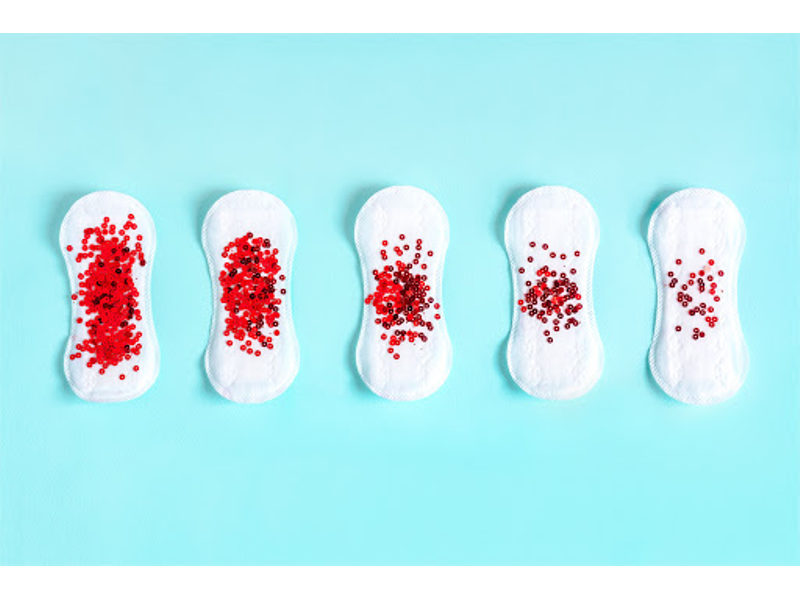Heavy flows and achy cramps can be common experiences when many women have their periods. However, heavy periods that prevent you from doing everyday activities aren’t normal. A board-certified OB-GYN with NYC Health + Hospitals, Dr. Heather Irobunda, said that we’ve been conditioned to think menorrhagia, a condition defined by a cycle that lasts more than seven days or produces heavy bleeding, is normal. According to a 2013 research paper, menorrhagia affects a large proportion of women and accounts for a substantial percentage of gynecologic referrals to secondary care.
What Constitutes Menorrhagia?
Signs and symptoms of menorrhagia may include:
- Soaking through one or more sanitary pads or tampons every hour for several hours
- Waking up in the middle of the night to change their sanitary pads
- Using two sanitary pads to manage heavy menstrual bleeding
- Bleeding longer than a week
- Passing blood clots larger than a quarter
- Restricting daily activities due to heavy menstrual bleeding
- Symptoms of anemia, tiredness, fatigue, and shortness of breath
Reasons Why Your Period May Be Excessively Heavier Than Ever
Endometriosis
Endometriosis is a painful condition that causes abnormal growth of the uterine lining and forms uterine polyps. A heavy period can also signal endometriosis. Other symptoms of endometriosis include severe menstrual cramps, pain during sex, lower back pain before or during your period, and difficulty with bowel movements. Endometriosis is notoriously difficult to diagnose.
Fibroids
Fibroids are noncancerous growths of the muscle tissue of the uterus that will often show up during a pelvic examination. You might be able to feel pain or pressure wherever on the abdomen the fibroid is located. They can develop on the outside of the uterus, within the wall, protrude into the cavity, or some combination of these. According to the Office on Women’s Health, anywhere from 20% to 80% of women have fibroids at some point by age 50. Fibroids can lead to heavy bleeding if they grow in places they shouldn’t or grow too big.
Polyps
A polyp is a usually non-cancerous growth attached to the inner wall of the womb. They can be caused by high estrogen levels, inflammation, or clogged cervical blood vessels. They’re most commonly found in women over 40 who’ve had many children. The symptoms of uterine polyps include irregular menstrual periods, unusually heavy flow during menstrual periods, and bleeding or spotting between periods. Treatment may not be necessary if the polyps do not cause any symptoms, but they can be surgically removed.

Thyroid issues
An overactive or underactive thyroid is one of the most common culprits for menstrual difficulties because your thyroid assists to control your menstrual cycle and lead to irregular periods. An underactive thyroid usually tends to be the heavy period producer, because your ovaries are not making enough progesterone which is the hormone that helps lower your flow. Most thyroid problems can be managed if properly diagnosed and treated.
Bleeding disorders
Heavy menstrual bleeding could be a sign of immune thrombocytopenia (ITP), which prevents blood from clotting properly. If you suffer from this condition, you may also experience easy bruising and nosebleeds. Von Willebrand disease is a lifelong bleeding disorder in which your blood doesn’t clot well especially if the heavy periods started when you were under 18. According to the National Heart, Lung, and Blood Institute, women who develop other bleeding disorders later in life, as a side effect of immune conditions, vaginal delivery, or other medical issues, can also experience heavy periods.
What To Do?
Just like there are many causes of menorrhagia, there are many treatment options available. Your doctor can usually determine the cause of heavy menstrual bleeding or excessive blood clotting by running a few tests. Birth control pills and hormonal IUDs may help balance hormones and manage periods. Removing polyps or fibroids may help reduce bleeding and ease other painful period symptoms. Your doctor might recommend hormone therapy to treat heavy periods caused by an imbalance of hormones. Hormone treatments, like progesterone pills, can be used as fast-acting methods for stopping heavy bleeding. They can also be used regularly to thin the uterine lining and help keep your hormones balanced daily.
Source

Boitumelo Masihleho is a South African digital content creator. She graduated with a Bachlor of Arts from Rhodes University in Journalism and Media Studies and Politics and International Studies. She’s an experienced multimedia journalist who is committed to writing balanced, informative and interesting stories on a number of topics. Boitumelo has her own YouTube channel where she shares her love for affordable beauty and lifestyle content.





